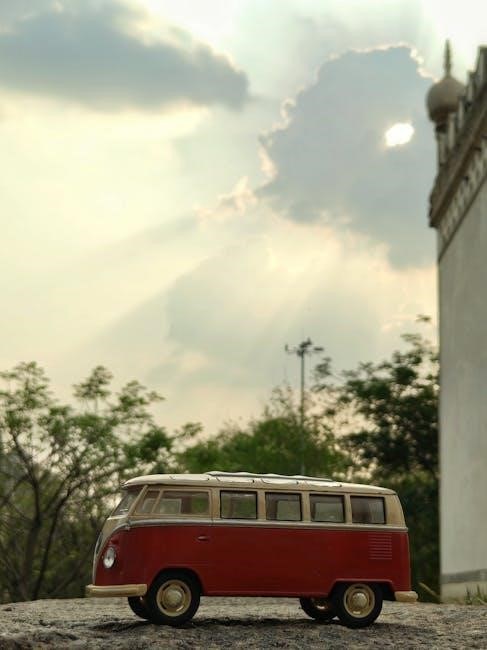Madeleine George’s Hurricane Diane reimagines Euripides’ The Bacchae in suburban New Jersey․ Diane, a butch gardener with supernatural charm, embodies Dionysus, exploring themes of climate change and queer identity through a modern lens․
Background and Inspiration
Madeleine George’s Hurricane Diane draws inspiration from Euripides’ The Bacchae, reimagining Dionysus as Diane, a butch gardener with supernatural charm․ Set in suburban New Jersey, the play blends Greek mythology with modern themes like climate change and queer identity․ The story explores how Diane’s arrival disrupts the status quo, challenging the residents to confront their environmental and social complacency․ George’s work reflects a deep connection to classical theater while addressing contemporary issues, making it a unique fusion of ancient and modern storytelling․
Modern Retelling of Euripides’ “The Bacchae”
Hurricane Diane reimagines Euripides’ The Bacchae in a contemporary setting, transforming Dionysus into Diane, a charismatic lesbian permaculture gardener․ Set in suburban New Jersey, the play blends ancient mythology with modern themes of environmentalism and social change․ Diane’s arrival disrupts the lives of the cul-de-sac residents, challenging their complacency and forcing them to confront their relationship with nature․ This modern retelling maintains the essence of Euripides’ exploration of divine intervention and societal upheaval while offering a fresh, queer perspective on the classic tale․

Plot Summary
Diane, a butch gardener with supernatural charm, arrives in a suburban New Jersey cul-de-sac, challenging residents to embrace environmental change and confront their complacent lives․
The Return of Dionysus as Diane
Diane, a modern incarnation of Dionysus, arrives in suburban New Jersey as a butch permaculture gardener․ With supernatural charm and wit, she transforms a ordinary garden into a vibrant, sustainable oasis․ Her presence disrupts the complacent lives of the residents, challenging them to confront environmental neglect and societal norms․ Diane’s divine identity gradually reveals itself, blending ancient mythology with contemporary themes of climate change and queer identity․ Her mission is not vengeance but awakening, urging the community to embrace radical change and reconnect with nature․ This unique retelling of The Bacchae explores power, identity, and transformation in a fresh, thought-provoking way․

Key Themes in “Hurricane Diane”
Madeleine George’s Hurricane Diane explores themes of climate change, queer identity, and societal transformation․ The play weaves environmentalism with queer storytelling, blending humor and sharp critique․
Climate Change and Environmentalism
Hurricane Diane uses the metaphor of a storm to explore environmental degradation and humanity’s disconnection from nature․ Diane, a permaculture gardener, embodies Dionysus, advocating for sustainable living․ The play critiques modern suburbia’s environmental neglect, highlighting the consequences of climate change through the lens of a divine intervention․ By blending mythology with contemporary issues, George emphasizes the urgent need for ecological consciousness and collective action․ The play serves as a powerful commentary on the intersection of human behavior and planetary health, urging audiences to reconsider their relationship with the natural world․
Queer Identity and Representation
Hurricane Diane celebrates queer identity through its protagonist, Diane, a butch lesbian permaculture gardener who embodies Dionysus․ The play explores themes of queerness as a form of divine disruption, challenging societal norms․ Diane’s charm and supernatural abilities symbolize the transformative power of queer presence in a heteronormative world․ By centering a queer character in a reimagined Greek tragedy, the play offers a fresh perspective on identity, blending mythology with modern queer experiences․ This representation underscores the importance of visibility and the intersections of queerness with environmental and cultural themes․
Character Analysis
Diane, a butch lesbian with supernatural charm, embodies Dionysus in modern form, challenging societal norms and inciting transformation through her divine yet relatable presence․
Diane: A Butch Charm with Supernatural Abilities
Diane, a lesbian permaculture gardener, captivates with her androgynous appeal and divine powers, blending masculinity and mystique․ As Dionysus reincarnated, she uses her charm to challenge suburban norms and inspire transformation, embodying both human relatability and godly authority․ Her presence sparks a mix of admiration and fear, making her a compelling, complex character who drives the play’s narrative forward with her unique blend of charisma and supernatural influence․

Staging and Production
The play is set in a suburban New Jersey garden, blending natural elements with minimalist staging to evoke a modern, intimate atmosphere that underscores the story’s themes․
Suburban New Jersey Setting
The play unfolds in a quaint suburban New Jersey garden, transforming an ordinary cul-de-sac into a stage for the extraordinary․ This setting contrasts sharply with the mythological origins of Dionysus, creating a modern, relatable backdrop․ The garden, often a symbol of growth and harmony, becomes a space where nature and human life intersect․ Diane’s presence as a permaculture gardener highlights themes of environmentalism and sustainability, while the suburban atmosphere underscores the tension between urban comfort and the wild, supernatural forces she embodies․ This setting effectively bridges the ancient and contemporary, making the divine accessible in a familiar, everyday environment․
Cultural and Social Significance
Hurricane Diane bridges Greek mythology with modern society, exploring themes of environmentalism, queerness, and community․ Its unique setting and characters challenge traditional narratives, fostering cultural dialogue and reflection on contemporary issues․
Exploring Greek Mythology in a Modern Context
Hurricane Diane reimagines Dionysus as Diane, a lesbian permaculture gardener, blending ancient mythology with modern suburbia․ This adaptation challenges traditional narratives by incorporating contemporary issues like climate change and queer identity, offering a fresh perspective on timeless themes․ By setting the story in a New Jersey cul-de-sac, the play creates a unique dialogue between past and present, making classical mythology relatable to today’s audience․ This fusion not only honors the original story but also expands its relevance, inviting new discussions on environmentalism and societal change․

Availability of “Hurricane Diane” Play in PDF
The script of Hurricane Diane is accessible in PDF format through various online platforms, including academic databases, theater websites, and digital libraries, for educational purposes․
Where to Find the Script Online
The PDF of Hurricane Diane can be found on platforms like Google Scholar, ResearchGate, and educational databases․ Additionally, theater websites and digital libraries offer access for study purposes․
Reception and Reviews
Hurricane Diane received critical acclaim for its bold reinterpretation of Greek mythology and queer themes․ Audiences praised its blend of humor and depth, resonating deeply with modern audiences․
Audience and Critical Response
Audiences and critics alike celebrated Hurricane Diane for its innovative storytelling and queer representation․ The play’s unique blend of humor and depth resonated deeply, making it a standout production․ Many praised Diane’s charm and the modern twist on classical themes․ The play’s exploration of climate change and identity struck a chord, sparking important conversations․ Overall, the response was overwhelmingly positive, with many hailing it as a fresh and impactful take on ancient mythology in a contemporary setting․

Educational Value
Hurricane Diane offers rich academic potential, blending classical mythology with modern issues like climate change․ Its queer themes and contemporary setting make it a valuable teaching tool for diverse classrooms․
Using the Play in Academic Settings
Madeleine George’s Hurricane Diane is a valuable resource for academic exploration․ In literature classes, it offers insights into modern adaptations of classical mythology, while its environmental themes align with eco-criticism studies․ The play’s queer representation makes it a powerful tool for discussions on identity and social justice․ Its accessible language and contemporary setting allow students to connect with universal themes․ Educators can use the play to teach critical thinking, dramatic structure, and the intersection of mythology with modern issues․ The availability of the play in PDF format makes it easy to incorporate into syllabi for close reading and analysis․

Future Productions and Adaptations
Hurricane Diane has potential for film or TV adaptations, blending mythology with modern themes․ Its unique voice and queer, environmental focus could attract streaming platforms for a compelling series․
Potential for Film or TV Adaptations
Hurricane Diane offers rich potential for film or TV adaptations, blending mythology with modern themes; Its unique mix of queer identity, environmentalism, and supernatural elements could captivate audiences․ The play’s vivid suburban setting and complex characters, particularly Diane’s butch charm, would translate well to the screen․ Streaming platforms might be drawn to its fresh perspective on classical themes, making it a compelling candidate for a limited series or feature film․ Adaptations could further amplify its cultural impact, bringing its urgent themes to a broader audience․

Leave a Reply
You must be logged in to post a comment.